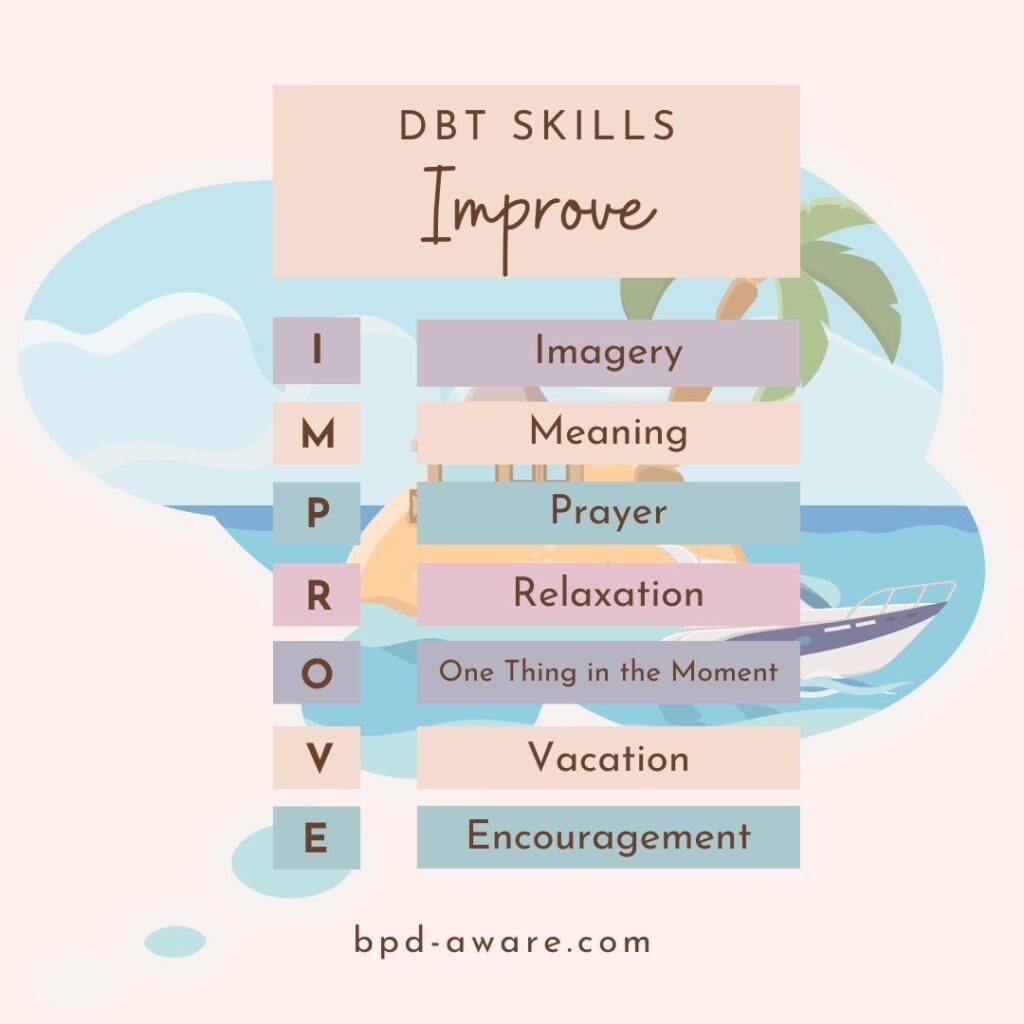Distress tolerance skills are one of the four modules of Dialectical Behavior Therapy (DBT) that provide the necessary tools to tolerate situations you can’t immediately change. This means accepting the situation and tolerating the unpleasant emotions.
One of these distress tolerance skills is IMPROVE, which is a system for coping with distressing situations when you can’t change them rather than resorting to self-destructive behaviors. Each letter in IMPROVE stands for an action you can take to lessen the intensity of painful moments while avoiding making the situation worse. It’s a skill that promotes mental toughness and acceptance.
Even if it only works for a short time, that’s better than suffering through a crisis without any tools. You can always repeat the cycle of letters if you feel the need to.
IMPROVE stands for:
- Imagery
- Meaning
- Prayer
- Relaxation
- One thing in the moment
- Vacation
- Encouragement

Imagery
Close your eyes and use your imagination to create a place different from the one you’re in now. Imagine a peaceful place, maybe somewhere you’ve always wanted to visit or one you’ve created entirely yourself.
Imagine yourself in this place. It could be a quiet beach on a warm day, a serene forest, a mountain trail, or anywhere you like. Focus on the details of your new environment. What can you see? What are the smells? What does the ground feel like beneath your feet? How does the air feel on your skin? The more details you can conjure up, the better.
You can also choose to imagine a stressful situation going well for you. It can be a difficult conversation with a friend or a work meeting that goes exactly as you hoped it would.
Allow yourself to get lost in this world for a while as the intensity of the emotional pain inside of you gradually reduces.
If you struggle with creating mental imagery like this or need a little help, guided meditations can lead you through a calming scenario.
Meaning
Try to find the meaning or purpose of your current situation. Make the best of a bad situation. What can you learn from this?
You can reflect on the challenge ahead of you and how it will lead to personal growth. Perhaps this situation could make you more resilient or compassionate. Maybe it will provide you with an experience that you can use to help other people.
Think of the ways, as big or small as they might be, that some good can come from your current situation. There’s always some kernel of good to be found in any situation, you just need to look for it.
Prayer
If you’re not religious or spiritual and you see this, I can understand you might panic – but there’s no need to worry.
The prayer section of IMPROVE simply requires you to vocalize (internally or externally) your thoughts to a higher power. This higher power can be the best version of yourself, the version of yourself you want to be.
Of course, if you are religious, you can pray to your deity if you choose to do so.
You can ask for strength during the prayer or maybe forgiveness, depending on the situation. You can also just discuss the details of the situation and how it has caused you distress.
A nice note to end a prayer on can be wishing for strength for others in similar situations. This can help increase empathy and mindfulness.
Relaxation
In distressing times, we tend to become tense both physically and mentally. By taking time to relax, as difficult as it might be, we allow the tension to leave our body and mind and prevent these negative thoughts and feelings from building up.
We all have our own ways to relax. Some of us take an active approach by engaging our bodies in exercise, others prefer a warm bath and a good book, while some people might prefer to engage in something mentally taxing like a puzzle or learning a new skill. As long as you’re not engaging in self-destructive behaviors, there are no bad ways to relax.
There are also relaxation techniques such as deep breathing exercises or progressive muscle relaxation that you might like to learn.
One Thing in the Moment
One thing in the moment is the same as mindfulness, an important part of DBT. Whatever you are doing now, focus on it fully. If other thoughts enter your mind, take a breath and push them aside. This can allow your mind to recuperate from the intense emotions it’s been experiencing.
Try to find something you enjoy doing and give it your full attention. It could be painting, gardening, reading, playing a video game, or another hobby or activity. Throw yourself into it and think of nothing else. Try and enter that flow state.
If that seems too difficult in your current state you can also try something like closing your eyes and counting from 1 to 100 or closing your eyes and then picturing every detail of the room you are in in your head.
Vacation
You don’t need to leave the country to have a vacation. You don’t even need to leave your house. Just take a short break from your worries to do something fun. You could go for a walk in a local park, watch your favorite comfort show, call a friend, or just close your eyes and drift away for a while.
One important thing to consider is not to take a vacation that will harm you. That means no reverting to self-destructive bad habits. It also means that you shouldn’t take a mental break for so long that it will cause you to miss important deadlines. That can just lead to more crises in the future.
Give yourself an hour or so and see how you feel.
Encouragement
Practice being your own best friend and give yourself some words of encouragement. Create a phrase (or several) that feels authentic to who you are, and repeat the mantra out loud or in your head.
Some examples of good positive affirmations are:
- “I’ve overcome challenges before so I can overcome this.”
- “I’m strong enough to survive this.”
- “I can make it through this.”
The way we think about ourselves and talk to ourselves has a tremendous impact on our moods.

Using the IMPROVE Skill
Start by identifying which component or components of IMPROVE resonate most with you and your current situation. You don’t have to use every skill if you don’t want to, nor do you have to work your way down like a list. For example, some people don’t like the prayer component of IMPROVE so they don’t use it.
Like with any skill, practice makes perfect. Experimenting with different components and how you utilize them can help you find the way IMPROVE works best for you. After experimenting with all the components of IMPROVE, you might find that Imagery, Meaning, and Relaxation work particularly well for you and choose to cycle through those three.
Remember that the goal of IMPROVE isn’t to remove distress entirely. It’s important to feel these emotions as part of the human experience. IMPROVE aims to reduce the intensity of the distress and make it all the more manageable.
Final Thoughts
DBT’s IMPROVE skill offers a multifaceted and personalized approach to coping with distressing situations positively. By using imagery, meaning, prayer, relaxation, one thing, vacation, and encouragement, you can make it through a crisis until you can better accept or change the situation.
With practice and experimentation, IMPROVE can become a powerful tool in your emotional toolkit, one which will help you endure tough times and make it through the other side.
Sources, Resources, and Further Reading
- DBT: IMPROVE the Moment — How to Make Crises Bearable: https://manhattancbt.com/dbt-improve-the-moment/
- DBT Distress Tolerance Skill: IMPROVE : https://www.mindchicago.com/articles/dbt-distress-tolerance-skill-improve-nbsp
- BPD Crisis Resources and Help (Updated for 2024): https://www.hopeforbpd.com/borderline-personality-disorder-treatment/borderline-crisis-help
- Crisis Resources Across the World: https://unsuicide.org/suicide-help/suicide-resources/
















